Search
Search Results

Article
Pizan's The Status of Women & the Reformation
The Book of the City of the Ladies (1405) by Christine de Pizan (l. 1364 - c. 1430) is considered by many scholars to be the first work of feminist literature, predating A Vindication of the Rights of Women (1792) by Mary Wollstonecraft by...

Article
La Rochelle, a Protestant Stronghold of the French Reformation
La Rochelle emerged early in the French Reformation as a Protestant political and military center. The city's fortifications withstood repeated sieges over the years. In 1627, La Rochelle was besieged by Cardinal Richelieu (l. 1585-1642...

Collection
Men of the Protestant Reformation
The men who initiated and advanced the vision of the Protestant Reformation (1517-1648) did not set out, at first, to challenge the authority of the Catholic Church but only to correct what they saw as errors. In doing so, they launched a...

Article
Christian Antisemitism in the Middle Ages & during the Reformation
Antisemitism is a modern term that describes prejudice and hostility to Jews and Judaism. The origins of Christian antisemitism in the gospels are based on the story of a 1st-century itinerant Jewish preacher, Jesus of Nazareth, in the Roman...

Article
Montpellier during the French Reformation
At the dawn of the French Wars of Religion (1562-1598), Montpellier in southern France had a significant Protestant minority that controlled the city's institutions. The Edict of Nantes in 1598 ended the wars and Protestants retained territorial...

Collection
Women of the Protestant Reformation
The contributions of women to the Protestant Reformation (1517-1648) were frequently marginalized in the past but have gained wider recognition in the present era. Many women played important roles in spreading the new vision of Christianity...

Image
International Monument to the Reformation (Reformation Wall)
The International Monument to the Reformation (Reformation Wall), Geneva, Switzerland. The monument honors the leading figures of Calvinism and was unveiled in 1909 on the 400th anniversary of the birth of John Calvin (l. 1509-1564). Reformer...

Image
Reformation Wall
William Farel (c. 1489-1565), Théodore de Bèze (1519-1605), John Calvin (1509-1564) and John Knox (1514-1572), stone monument portraying prominent figures of the Protestant Reformation, by Paul Landowski and Henri Bouchard, 1909.
Geneva.

Image
Reformation in Germany
Joseph Fiennes as Martin Luther (1483-1546) in Luther (2003).
Image credit: Eikon Film and NFP Teleart.

Definition
Marie Dentière
Marie Dentière (l. c. 1495-1561) was a French theologian, writer, and street preacher who advanced the cause of the Protestant Reformation in Geneva, Switzerland. Her written works were controversial primarily because she was a woman and...